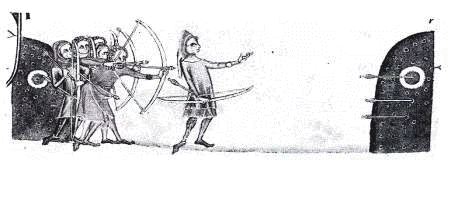The Legend 2
 In the fifteenth century, minstrels were maintained in at least twenty aristocratic households in northern England. Their owners included Richard duke of Gloucester, the earls of Northumberland, Sir John Conyers, and Sir James Harrington. The monarchy was probably the biggest employer of entertainers, and in 1469 Edward IV incorporated the royal minstrels as a guild. However, it appears that none of the aristocracy of the thirteenth, fourteenth, or fifteenth centuries, ever mention Robin Hood outlaw. The common man may have had his own class of minstrel as well, these could have been the travelling gleemen who composed their own ballads, and it could have been they who wrote the original Robin Hood ballads.
In the fifteenth century, minstrels were maintained in at least twenty aristocratic households in northern England. Their owners included Richard duke of Gloucester, the earls of Northumberland, Sir John Conyers, and Sir James Harrington. The monarchy was probably the biggest employer of entertainers, and in 1469 Edward IV incorporated the royal minstrels as a guild. However, it appears that none of the aristocracy of the thirteenth, fourteenth, or fifteenth centuries, ever mention Robin Hood outlaw. The common man may have had his own class of minstrel as well, these could have been the travelling gleemen who composed their own ballads, and it could have been they who wrote the original Robin Hood ballads.
In the fifteenth century local society was divided into different groups. First there were the knights, then came the squires, gentlemen, yeomen and husbandmen. Robin, his merry men, and some of the other characters are described as yeomen. The term ‘yeoman’ is used extensively in the ballads but definition is not easy, as the meaning had changed over the years. Originally, he could be a farmer or leaseholder with a small income, or an employee of the estate such as a forester or gamekeeper. By the fifteenth century, the term could also apply to a craftsman such as a potter or weaver.
The Scotsman Walter Bower wrote of Robin Hood and Little John in the Scotichronicon, a history of Scotland and England written in the 1440s: ‘The foolish common folk eagerly celebrate the deeds of these men with gawping enthusiasm in comedies and tragedies, and take pleasure in hearing jesters and bards singing (of them) more than in other romances’. This suggests that in the fifteenth century, tales of Robin Hood were entertainment for the common man. Bower was probably referring to the labourers and craftsmen in the towns and villages of Scotland and northern England. There were other forms of entertainment such as cockfights and bull baiting, and archery was a skill shared by all social classes that would practice or compete at the butts.


|
